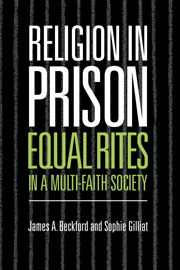Book contents
- Frontmatter
- Contents
- List of figures
- List of tables
- Abbreviations
- Preface
- 1 Equal opportunities and multiculturalism in prisons
- 2 Chaplaincy, chaplains, chapels and other faiths
- 3 Church of England prison chaplains
- 4 Visiting Ministers of other faiths
- 5 ‘Facilitation’ or ‘dependence’?
- 6 Inclusion and exclusion
- 7 Prison chaplaincy in the United States
- 8 Conclusions: state, church and diversity
- Notes
- Appendix
- References
- Index
7 - Prison chaplaincy in the United States
Published online by Cambridge University Press: 22 August 2009
- Frontmatter
- Contents
- List of figures
- List of tables
- Abbreviations
- Preface
- 1 Equal opportunities and multiculturalism in prisons
- 2 Chaplaincy, chaplains, chapels and other faiths
- 3 Church of England prison chaplains
- 4 Visiting Ministers of other faiths
- 5 ‘Facilitation’ or ‘dependence’?
- 6 Inclusion and exclusion
- 7 Prison chaplaincy in the United States
- 8 Conclusions: state, church and diversity
- Notes
- Appendix
- References
- Index
Summary
The speed with which the prison population expanded and became religiously diverse after 1960 created many challenges for the Prison Service of England and Wales. One of the most intriguing but least publicised of these challenges concerns the provision of religious and spiritual care for inmates from all religious, ethnic and cultural backgrounds. Any chaplaincy system would probably have found it difficult to adjust to such rapid and radical changes. The fact that the Prison Service Chaplaincy (PSC) remained a predominantly Christian and Anglican organisation produced both positive and negative consequences. The positive benefits included continuity of ethos, privileged access to leading officials in government and state, the maintenance of a relatively sound reputation for chaplains in the Prison Service, and an affinity with the country's most representative religious organisation. On the negative side, the Church of England's ascendancy over prison chaplaincy made non-Christian faith communities appear marginal to the PSC, perpetuated the dependence of other faiths on Anglican patronage and brokerage, kept Visiting Ministers of other faiths in a subservient position and gave rise to a fear that chaplains were being expected to devote a disproportionately large amount of their time to facilitating the religious observances of prisoners belonging to other faiths.
The close relationship between the established Church of England and the PSC is therefore at the centre of our interest in the capacity of chaplaincy to cope with the increase of religious diversity among staff and prisoners.
- Type
- Chapter
- Information
- Religion in Prison'Equal Rites' in a Multi-Faith Society, pp. 171 - 200Publisher: Cambridge University PressPrint publication year: 1998



